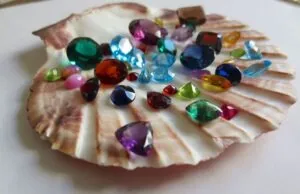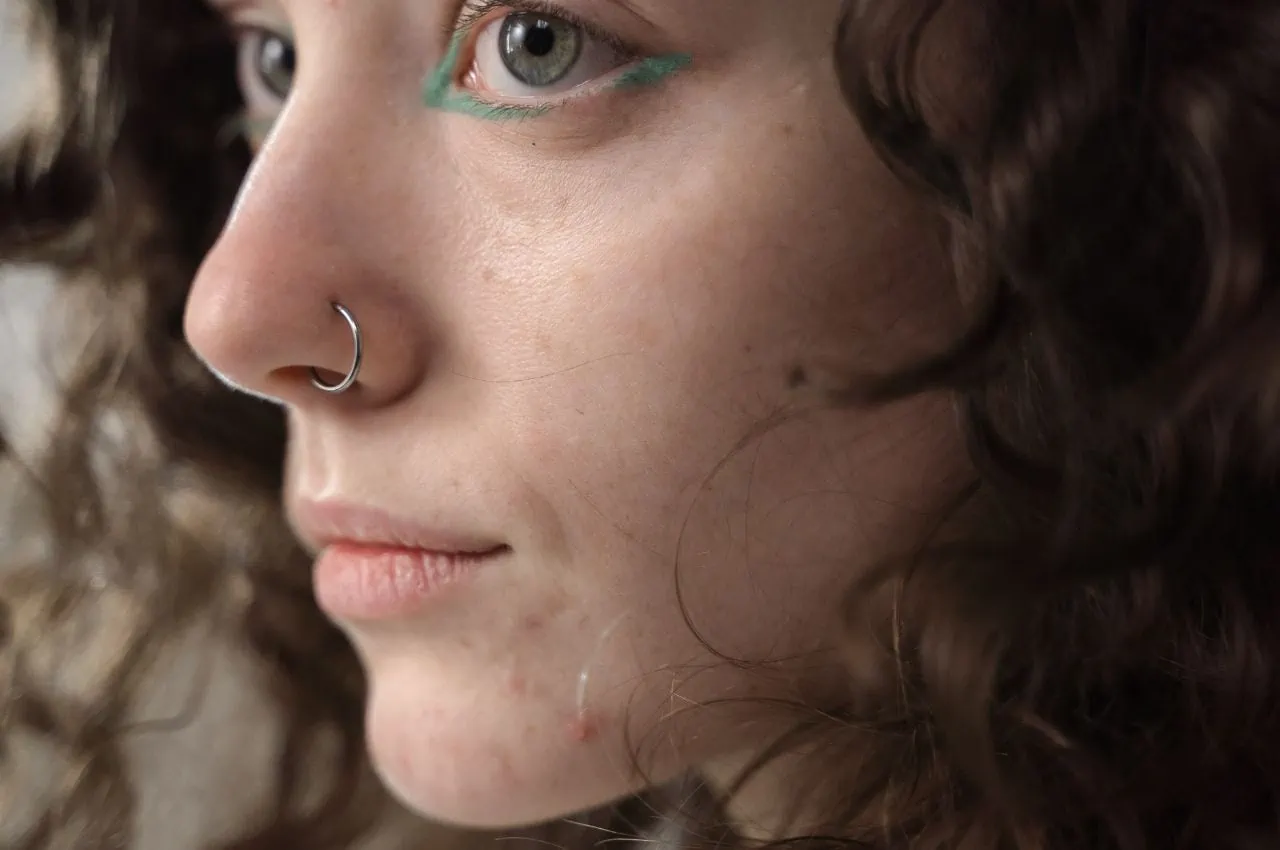
Table of Contents
Nose rings, a blend of tradition and modern style, come in a plethora of metals, but not all are created equal. The choice of metal doesn’t just affect the look and feel, but also has significant implications for your health and comfort.
Opting for the wrong type can lead to irritations, allergic reactions, or prolonged healing times. So, what metal should you gravitate towards for your nose piercing? Let’s take a look.
The Best Metals for Nose Rings
The following metals are commonly used for nose piercings and are known for generally reducing irritation, infections and discomfort.
1. Surgical Stainless Steel (316L and 316LVM)

Surgical stainless steel is often the go-to choice for nose piercings, especially among those venturing into their first piercing or those tending to a healing one. This type of steel is favored due to its hypoallergenic properties, meaning it is designed to minimize allergic reactions. It provides a comfortable experience, reducing the chances of skin irritations during the crucial healing phase.
This metal’s versatility in design and affordability makes it a crowd-favorite among both piercing artists and enthusiasts. However, while surgical stainless steel is generally safe and reliable, it might not be the perfect fit for everyone, especially those with specific metal sensitivities.
Pros:
- Hypoallergenic nature minimizes skin reactions
- Affordable option for many
- Ideal for new and healing piercings
- Versatile in design and appearance
- Durable and resistant to tarnishing
Cons:
- Not as shiny as some precious metals
- Tends to be heavier than alternatives like titanium
- Not suitable for individuals with certain metal allergies
- Needs consistent cleaning to maintain its luster
2. Titanium

Titanium is known for its strength and its safe use with the human body. If you’re considering it for jewelry, always opt for the type certified for implants. Compared to stainless steel, titanium is both sturdier and lighter, with minimal nickel content.
This metal is also tough against scratches, ensuring your jewelry stays pristine for longer. While titanium offers many benefits, its higher price tag might be a drawback for some.
Pros:
- Strong and long-lasting
- Safe for the body (bio-compatible)
- Lighter than stainless steel
- Barely any nickel content
- Resists scratches well
Cons:
- Generally more expensive
- Not as widely available in designs
- Some people prefer the heft of heavier metals
- Not all titanium jewelry is implant-grade
- Can be harder to adjust or resize due to its strength
3. Niobium

Niobium is gaining popularity in the world of nose piercings due to its unique properties. It’s a pure metal, unlike many alloys used in jewelry, making it a hypoallergenic choice. This means that reactions or irritations are far less common, making it ideal for those with sensitive skin or allergies.
Niobium boasts a natural shine and can be anodized to produce a variety of vibrant colors without affecting its hypoallergenic nature. Though it is slightly heavier than titanium, it’s flexible, allowing for easier adjustments.
Pros:
- Hypoallergenic and safe for sensitive skin
- Can be colored through anodization
- Natural luster and shine
- Flexible for adjustments
- Doesn’t corrode or tarnish easily
Cons:
- Heavier than some other metals
- Typically pricier than stainless steel
- Limited availability in some jewelry designs
- Not as widely recognized or utilized as titanium or stainless steel
- Can be difficult to find in mainstream jewelry stores
4. Gold

Gold, with its timeless allure, stands as a top contender for nose piercings. Because of its hypoallergenic nature, gold ensures a reduced risk of skin irritations, making it a prime choice for many. While its allure is undeniable, it’s important to choose the appropriate kind of gold for piercings.
Real gold in forms such as 14k or 18k are ideal. These variants blend gold with other metals, predominantly copper, endowing the gold with the needed strength for everyday wear. Pure gold, in its natural state, is delicate, leading to quick wear and possible deformities.
When contemplating gold for nose piercings, especially fresh ones, avoid options like gold-filled, gold-plated, rolled-gold, or gold vermeil. These lack the quality and safety features of solid gold.
Pros:
- Hypoallergenic properties reduce skin irritation risks
- Radiates a timeless elegance
- High-quality real gold doesn’t tarnish
- Offers a luxurious feel and appearance
- Available in yellow, rose, and white variants
Cons:
- Pure gold is too malleable for everyday wear
- Higher price point than many other metals
- Risk of accidentally choosing lower-quality gold variants
- Not always suited for those on a tight budget
- Requires regular maintenance
5. Platinum
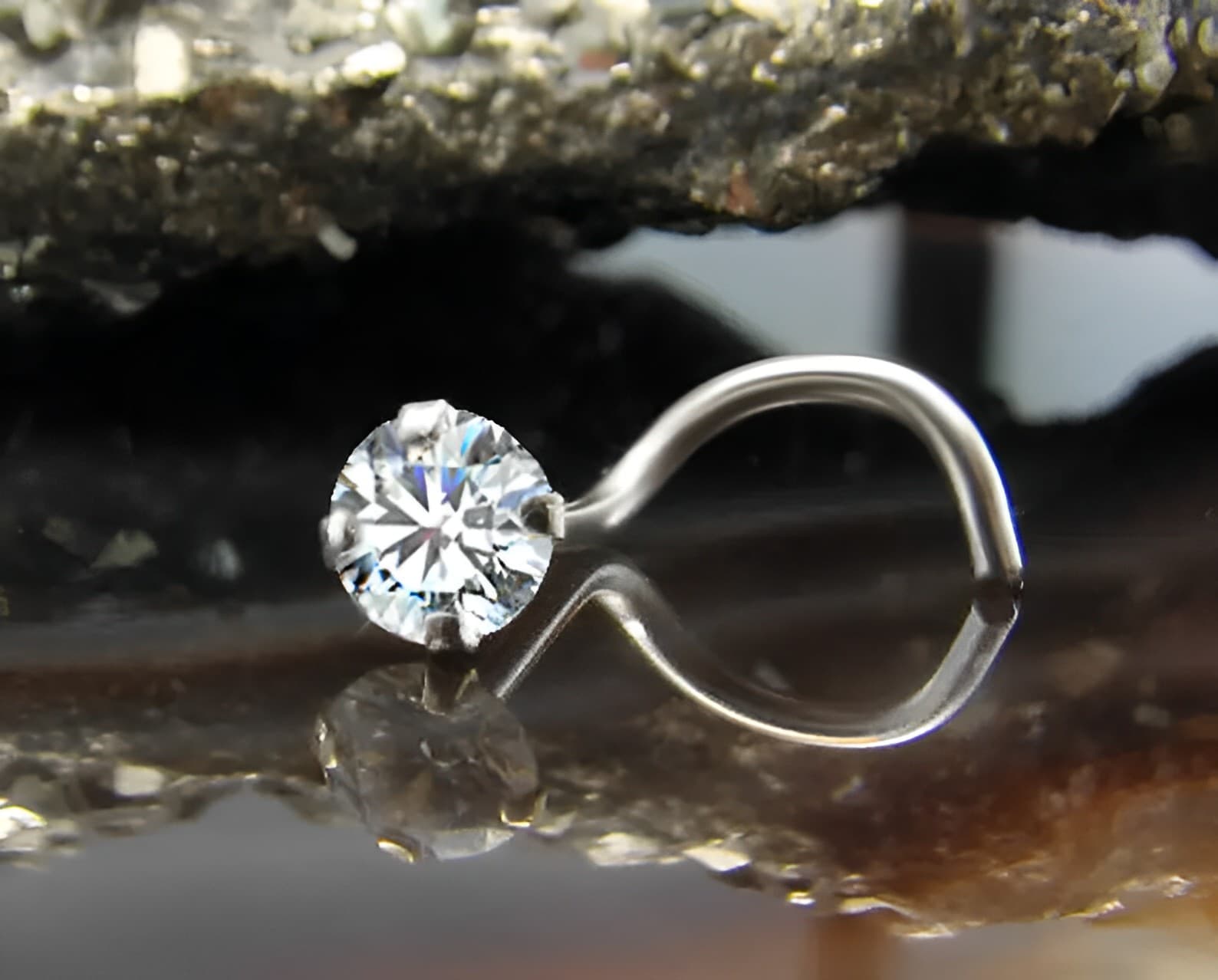
Platinum, often dubbed the “king of metals”, is a luxurious choice for nose piercings. With its natural white sheen, it never needs rhodium plating, unlike white gold. It’s recognized for its durability and purity. Platinum is naturally hypoallergenic, making it an excellent option for individuals with sensitive skin or allergies to other metals.
Given its density, platinum jewelry is more substantial, often lending a feel of premium quality. While it’s one of the rarest metals, making it pricier, its resilience ensures that your nose jewelry remains untarnished and in prime condition over the years, potentially making it a long-term investment.
Pros:
- Hypoallergenic
- Durable and tarnish-resistant
- Luxurious and premium feel
- Natural white shine
- Retains gemstones securely due to its strength
Cons:
- Expensive
- Heavier than other metals
- Limited designs due to cost
- Not as common in piercing studios
- Scratches can appear over time, requiring polishing
Metals to Avoid
The following metals are not recommended for fresh or healing piercings. It’s best to wait until the skin has completely healed before wearing these metals.
1. Sterling Silver
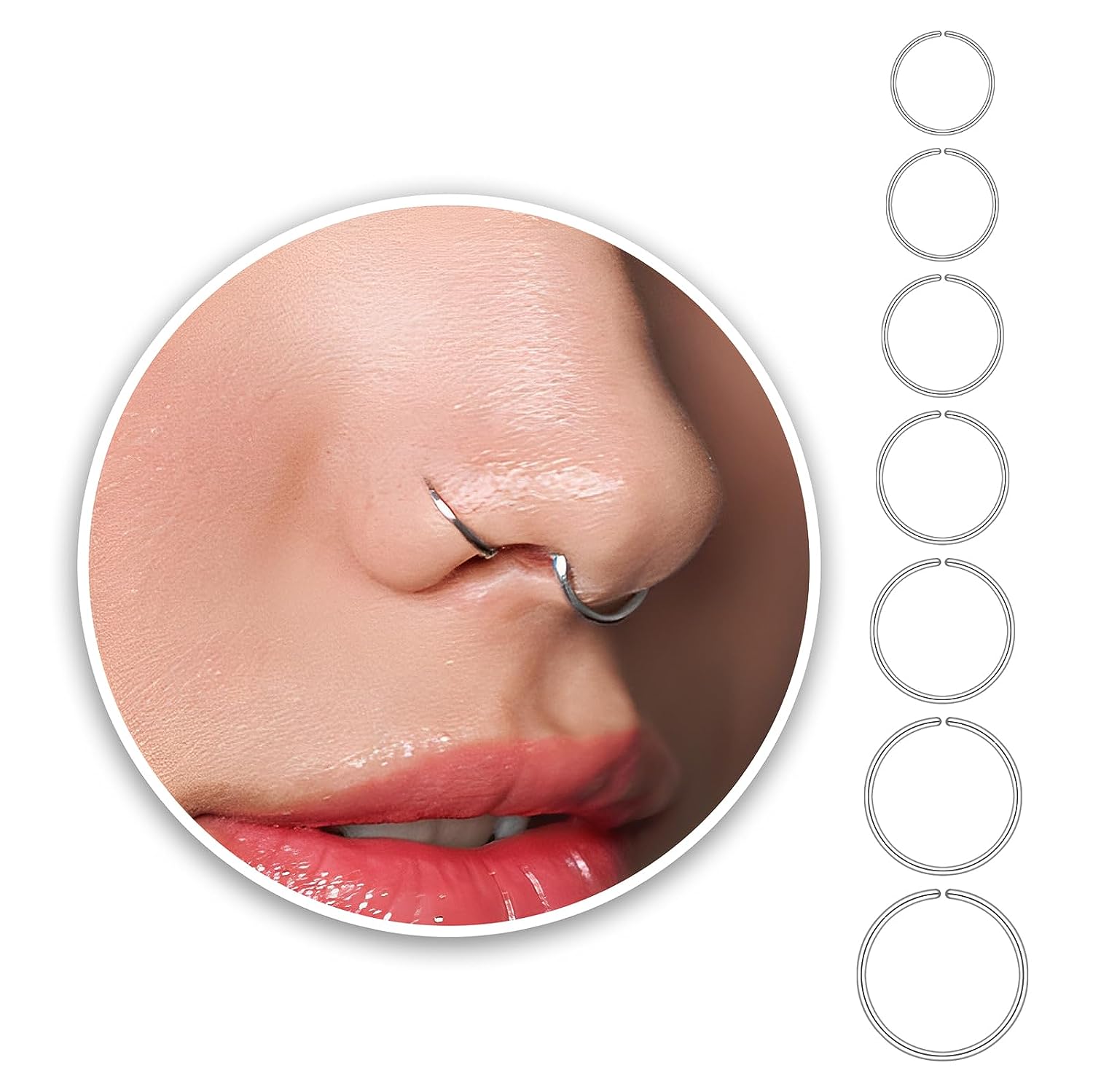
While sterling silver is known for being a hypoallergenic metal, it’s not a good choice for a new piercing. Silver oxidizes and tarnishes when in contact with bodily fluids. This turns the metal black and when this comes into contact with skin, the silver can actually give your skin a permanent black stain. It’s impossible to make this stain go away so it is best to avoid silver until your piercing has completely healed.
2. Plastic and Nylon
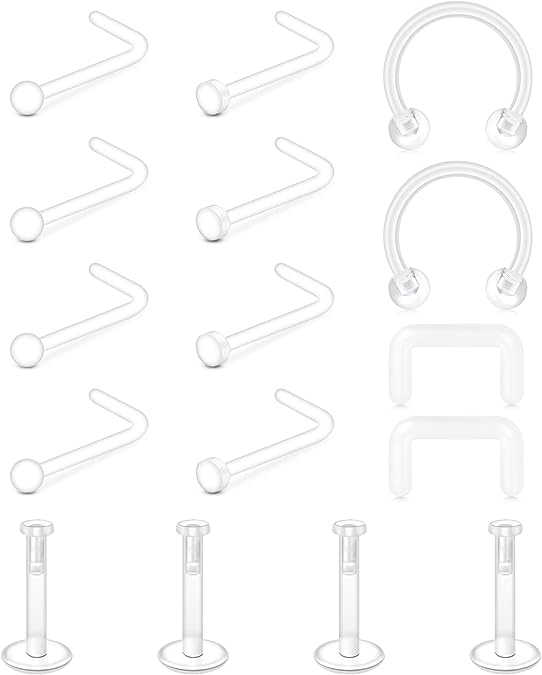
Although both plastic and nylon are also hypoallergenic, they tend to be somewhat porous. What this means for you is that they can absorb bodily fluids which can result in infections due to bacteria growth. Also, these types of nose jewelry can stick to the skin.
3. Plated-Metals
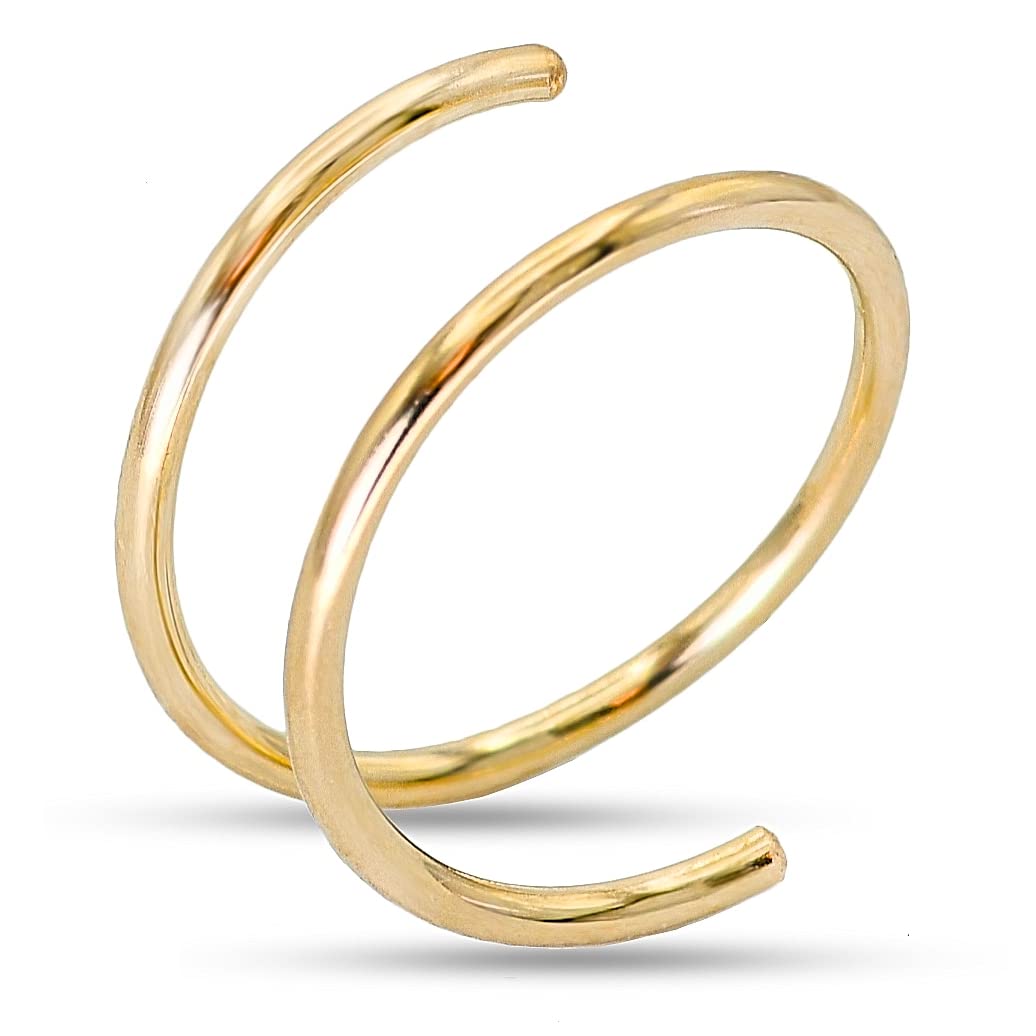
These types of metals include plated, rolled, vermeil or filled metals. Basically, this is where a base metal, such as copper, zinc or nickel is simply coated with a thin layer of gold (or silver) to make it appear like the real thing.
The trouble with plated metals is that over time, as the plating inevitably wears off, the base metal will come into contact with your skin and can irritate the skin and cause reactions.
Plated metals generally tend to wear off faster when in contact with body fluids, meaning that they discolor and are not very durable. It is best to avoid these in general for nose piercings.
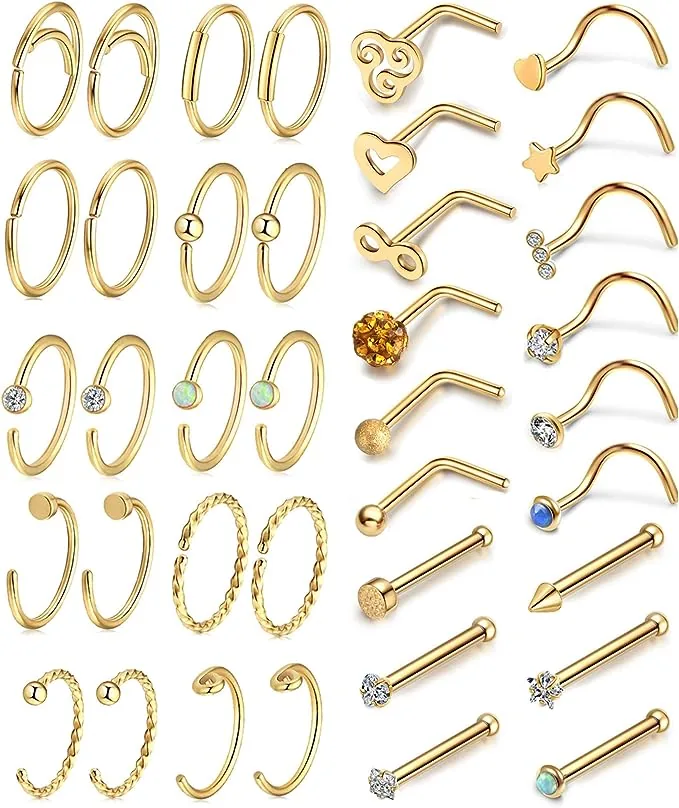
Choosing a metal for your nose piercing will be a factor in making the whole experience a comfortable one. Think of this not as jewelry but as a surgical implant. You wouldn’t choose a cheap, incompatible metal for that so why do that here?
Always go for a bio-compatible and durable metal. It’s best not to skimp but to invest in a high-quality metal as it will save you lots of headaches down the line.
Where to Buy Nose Rings

1. Etsy
Etsy is a global online marketplace celebrated for its handcrafted and unique offerings. It’s an ideal platform for those seeking distinctive nose rings, often directly from artisans. The site provides a range of styles and materials, and the direct communication with sellers can allow for custom designs. However, buyers should check seller ratings and reviews to gauge product quality and authenticity. Check what’s available here.
2. Amazon
Amazon, a vast online retail giant, offers an extensive selection of nose rings catering to all price ranges. With its user-friendly filters, buyers can quickly narrow down choices based on material, brand, or customer feedback. While the platform offers convenience and variety, it’s crucial for buyers to read detailed descriptions and prioritize products with positive reviews for the best experience. Search Amazon here.
Wrapping Up
Choosing the perfect metal for your nose ring isn’t just about aesthetics; it’s about ensuring comfort, longevity, and minimizing potential complications. The variety of metals available offers something for everyone, whether you prioritize hypoallergenic properties, durability, or pure luxury. By investing time in understanding the unique attributes of each metal, you’ll not only flaunt a stunning nose ring but also enjoy a smooth and irritation-free piercing experience.







